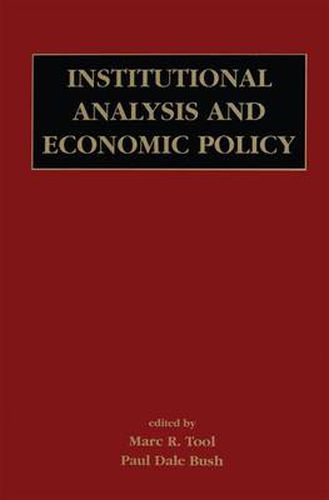Readings Newsletter
Become a Readings Member to make your shopping experience even easier.
Sign in or sign up for free!
You’re not far away from qualifying for FREE standard shipping within Australia
You’ve qualified for FREE standard shipping within Australia
The cart is loading…






This title is printed to order. This book may have been self-published. If so, we cannot guarantee the quality of the content. In the main most books will have gone through the editing process however some may not. We therefore suggest that you be aware of this before ordering this book. If in doubt check either the author or publisher’s details as we are unable to accept any returns unless they are faulty. Please contact us if you have any questions.
The purpose of this volume is to demonstrate how contemporary institutional economic analysis can be applied to the resolution of economic problems. All of the essays in this book challenge the conventional wisdom in the problem areas addressed. They advocate policy positions that often run contrary to views widely held by academic economists and policy makers alike. The general literature of institutional economics is unorthodox, beginning with its methodological foundations and continuing through the kind of policy analysis found in these pages. The orthodox tradition in economics is commonly characterized as neoclassical economics. Neoclassical economics fosters the myth that only the market can efficiently allocate a society’s economic resources and equitably distribute its income. It provides the intellectual defense for in which free markets are championed over democratic capitalist ideology policy formation, which it contends is neither efficient nor equitable. For both professional economists and policy makers of a conservative political persuasion, neoclassical economics writes the script for a morality play in which the market is the good guy and the government is the bad guy. As such, it undermines the belief that free societies can enhance economic welfare through the use of democratic processes in the formulation of economic policies.
$9.00 standard shipping within Australia
FREE standard shipping within Australia for orders over $100.00
Express & International shipping calculated at checkout
This title is printed to order. This book may have been self-published. If so, we cannot guarantee the quality of the content. In the main most books will have gone through the editing process however some may not. We therefore suggest that you be aware of this before ordering this book. If in doubt check either the author or publisher’s details as we are unable to accept any returns unless they are faulty. Please contact us if you have any questions.
The purpose of this volume is to demonstrate how contemporary institutional economic analysis can be applied to the resolution of economic problems. All of the essays in this book challenge the conventional wisdom in the problem areas addressed. They advocate policy positions that often run contrary to views widely held by academic economists and policy makers alike. The general literature of institutional economics is unorthodox, beginning with its methodological foundations and continuing through the kind of policy analysis found in these pages. The orthodox tradition in economics is commonly characterized as neoclassical economics. Neoclassical economics fosters the myth that only the market can efficiently allocate a society’s economic resources and equitably distribute its income. It provides the intellectual defense for in which free markets are championed over democratic capitalist ideology policy formation, which it contends is neither efficient nor equitable. For both professional economists and policy makers of a conservative political persuasion, neoclassical economics writes the script for a morality play in which the market is the good guy and the government is the bad guy. As such, it undermines the belief that free societies can enhance economic welfare through the use of democratic processes in the formulation of economic policies.